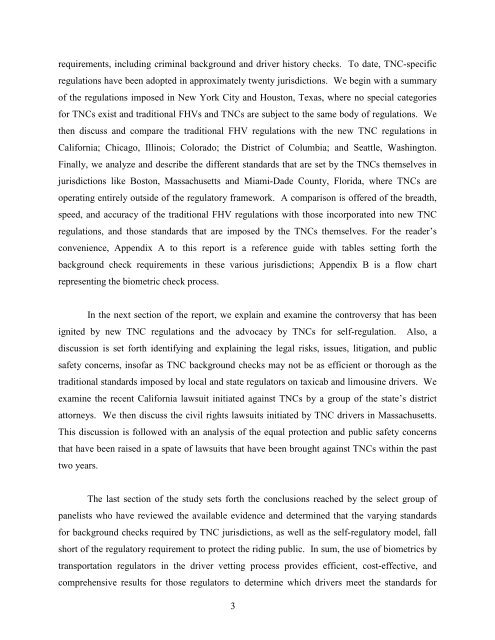Background Check Report
Background Check Report
Background Check Report
Create successful ePaper yourself
Turn your PDF publications into a flip-book with our unique Google optimized e-Paper software.
equirements, including criminal background and driver history checks. To date, TNC-specificregulations have been adopted in approximately twenty jurisdictions. We begin with a summaryof the regulations imposed in New York City and Houston, Texas, where no special categoriesfor TNCs exist and traditional FHVs and TNCs are subject to the same body of regulations. Wethen discuss and compare the traditional FHV regulations with the new TNC regulations inCalifornia; Chicago, Illinois; Colorado; the District of Columbia; and Seattle, Washington.Finally, we analyze and describe the different standards that are set by the TNCs themselves injurisdictions like Boston, Massachusetts and Miami-Dade County, Florida, where TNCs areoperating entirely outside of the regulatory framework. A comparison is offered of the breadth,speed, and accuracy of the traditional FHV regulations with those incorporated into new TNCregulations, and those standards that are imposed by the TNCs themselves. For the reader’sconvenience, Appendix A to this report is a reference guide with tables setting forth thebackground check requirements in these various jurisdictions; Appendix B is a flow chartrepresenting the biometric check process.In the next section of the report, we explain and examine the controversy that has beenignited by new TNC regulations and the advocacy by TNCs for self-regulation. Also, adiscussion is set forth identifying and explaining the legal risks, issues, litigation, and publicsafety concerns, insofar as TNC background checks may not be as efficient or thorough as thetraditional standards imposed by local and state regulators on taxicab and limousine drivers. Weexamine the recent California lawsuit initiated against TNCs by a group of the state’s districtattorneys. We then discuss the civil rights lawsuits initiated by TNC drivers in Massachusetts.This discussion is followed with an analysis of the equal protection and public safety concernsthat have been raised in a spate of lawsuits that have been brought against TNCs within the pasttwo years.The last section of the study sets forth the conclusions reached by the select group ofpanelists who have reviewed the available evidence and determined that the varying standardsfor background checks required by TNC jurisdictions, as well as the self-regulatory model, fallshort of the regulatory requirement to protect the riding public. In sum, the use of biometrics bytransportation regulators in the driver vetting process provides efficient, cost-effective, andcomprehensive results for those regulators to determine which drivers meet the standards for{11081861:2} 3


